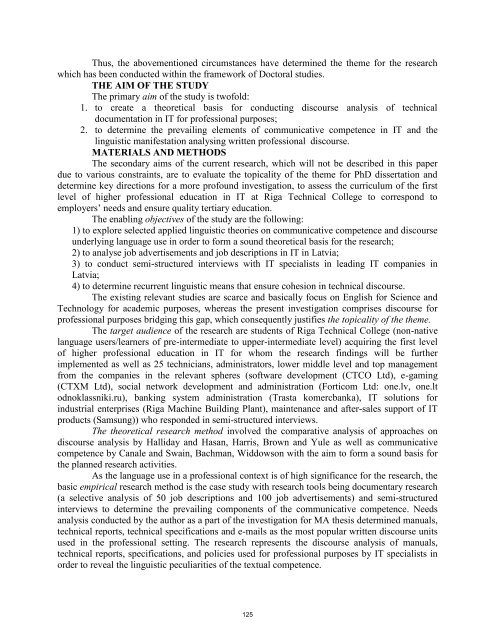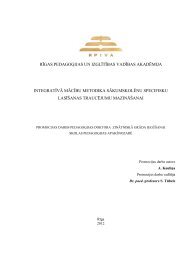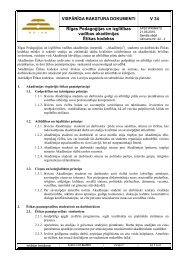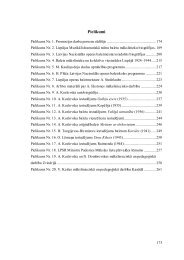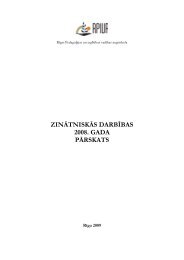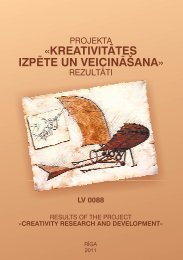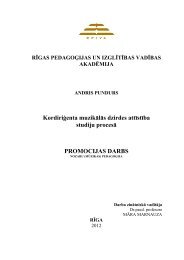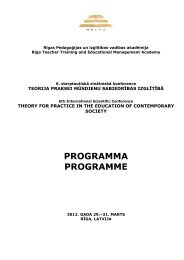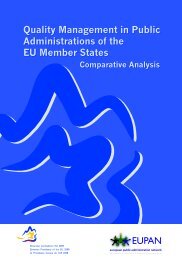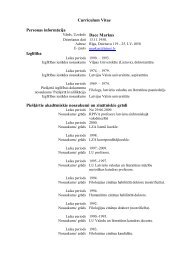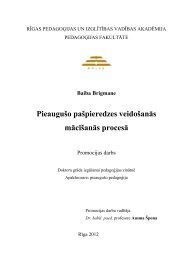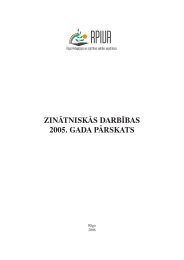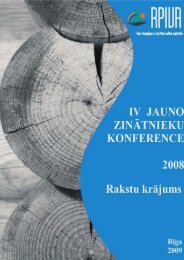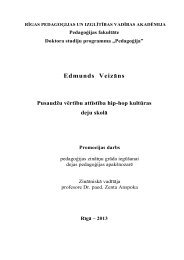saturs - rpiva
saturs - rpiva
saturs - rpiva
- No tags were found...
You also want an ePaper? Increase the reach of your titles
YUMPU automatically turns print PDFs into web optimized ePapers that Google loves.
Thus, the abovementioned circumstances have determined the theme for the research<br />
which has been conducted within the framework of Doctoral studies.<br />
THE AIM OF THE STUDY<br />
The primary aim of the study is twofold:<br />
1. to create a theoretical basis for conducting discourse analysis of technical<br />
documentation in IT for professional purposes;<br />
2. to determine the prevailing elements of communicative competence in IT and the<br />
linguistic manifestation analysing written professional discourse.<br />
MATERIALS AND METHODS<br />
The secondary aims of the current research, which will not be described in this paper<br />
due to various constraints, are to evaluate the topicality of the theme for PhD dissertation and<br />
determine key directions for a more profound investigation, to assess the curriculum of the first<br />
level of higher professional education in IT at Riga Technical College to correspond to<br />
employers‟ needs and ensure quality tertiary education.<br />
The enabling objectives of the study are the following:<br />
1) to explore selected applied linguistic theories on communicative competence and discourse<br />
underlying language use in order to form a sound theoretical basis for the research;<br />
2) to analyse job advertisements and job descriptions in IT in Latvia;<br />
3) to conduct semi-structured interviews with IT specialists in leading IT companies in<br />
Latvia;<br />
4) to determine recurrent linguistic means that ensure cohesion in technical discourse.<br />
The existing relevant studies are scarce and basically focus on English for Science and<br />
Technology for academic purposes, whereas the present investigation comprises discourse for<br />
professional purposes bridging this gap, which consequently justifies the topicality of the theme.<br />
The target audience of the research are students of Riga Technical College (non-native<br />
language users/learners of pre-intermediate to upper-intermediate level) acquiring the first level<br />
of higher professional education in IT for whom the research findings will be further<br />
implemented as well as 25 technicians, administrators, lower middle level and top management<br />
from the companies in the relevant spheres (software development (CTCO Ltd), e-gaming<br />
(CTXM Ltd), social network development and administration (Forticom Ltd: one.lv, one.lt<br />
odnoklassniki.ru), banking system administration (Trasta komercbanka), IT solutions for<br />
industrial enterprises (Riga Machine Building Plant), maintenance and after-sales support of IT<br />
products (Samsung)) who responded in semi-structured interviews.<br />
The theoretical research method involved the comparative analysis of approaches on<br />
discourse analysis by Halliday and Hasan, Harris, Brown and Yule as well as communicative<br />
competence by Canale and Swain, Bachman, Widdowson with the aim to form a sound basis for<br />
the planned research activities.<br />
As the language use in a professional context is of high significance for the research, the<br />
basic empirical research method is the case study with research tools being documentary research<br />
(a selective analysis of 50 job descriptions and 100 job advertisements) and semi-structured<br />
interviews to determine the prevailing components of the communicative competence. Needs<br />
analysis conducted by the author as a part of the investigation for MA thesis determined manuals,<br />
technical reports, technical specifications and e-mails as the most popular written discourse units<br />
used in the professional setting. The research represents the discourse analysis of manuals,<br />
technical reports, specifications, and policies used for professional purposes by IT specialists in<br />
order to reveal the linguistic peculiarities of the textual competence.<br />
125


